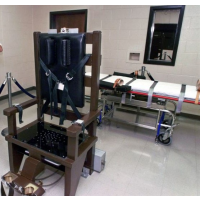States Scour the Globe for Scarce Lethal Drugs, but Some Still Find Ways to Execute its Death Row Inmates
 Tennessee’s electric chair (photo: Mark Humphrey, Getty Images)
Tennessee’s electric chair (photo: Mark Humphrey, Getty Images)
The lack of available drug supplies for executions has forced many states to look far and wide for solutions, even turning to old methods for enforcing capital punishment.
Corrections officials in Ohio and Nebraska have tried to buy drugs for lethal injections from overseas suppliers.
Ohio, which halted all executions but hopes to restart them next year, has tried to obtain a sedative, sodium thiopental, from another country to use as part of its death-penalty cocktail. But the move prompted a warning from the Food and Drug Administration (FDA), which informed Ohio that it had not approved an application for sodium thiopental, “and it is illegal to import an unapproved new drug into the United States,” the agency warned in a letter.
Nebraska also has looked to foreign suppliers, turning to a source in India. The state Department of Correctional Services has reportedly ordered hundreds of vials and capsules of sodium thiopental and pancuronium bromide at a cost of more than $50,000. However, the drugs have not been delivered and would fall under the same restrictions as Ohio’s attempted purchases.
Texas has gone with a sedative known as pentobarbital made by a compounding pharmacy, which are largely unregulated by the FDA, instead of buying it from a drug manufacturer. The state was gracious enough to share some of its pentobarbital with Virginia, which had previously shared some of its execution drugs with Texas.
Other states have opted for execution methods that were long ago discarded. If lethal injection is not available, Tennessee intends to use the electric chair, while Utah has approved firing squads once again. Oklahoma and Louisiana are considering the use of nitrogen gas, either in a chamber or delivered through a mask.
Oklahoma has called a temporary halt to its executions until it can either get more drugs or settle on another method. Previous executions there have been horribly botched, with inmates crying out in pain. Later it was discovered that the prison had used the wrong drug.
-Noel Brinkerhoff
To Learn More:
Delays as Death-Penalty States Scramble for Execution Drugs (by Manny Fernandez, New York Times)
Ohio Death Row Quandary: 2 Dozen Executions, No Lethal Drugs (by Andrew Welsh-Huggins, Associated Press)
Meet the Woman behind a Shortage of Execution Drugs (by Holly Williams, Vox)
California Back on the Slow Path to Resuming Executions (by Ken Broder, AllGov California)
Georgia Uses Secrecy Law to Obtain Lethal Drug for Execution of Mentally Disabled Prisoner (by Danny Biederman and Noel Brinkerhoff, AllGov)
- Top Stories
- Unusual News
- Where is the Money Going?
- Controversies
- U.S. and the World
- Appointments and Resignations
- Latest News
- Trump Orders ICE and Border Patrol to Kill More Protestors
- Trump Renames National Football League National Trump League
- Trump to Stop Deportations If…
- Trump Denounces World Series
- What If China Invaded the United States?






Comments